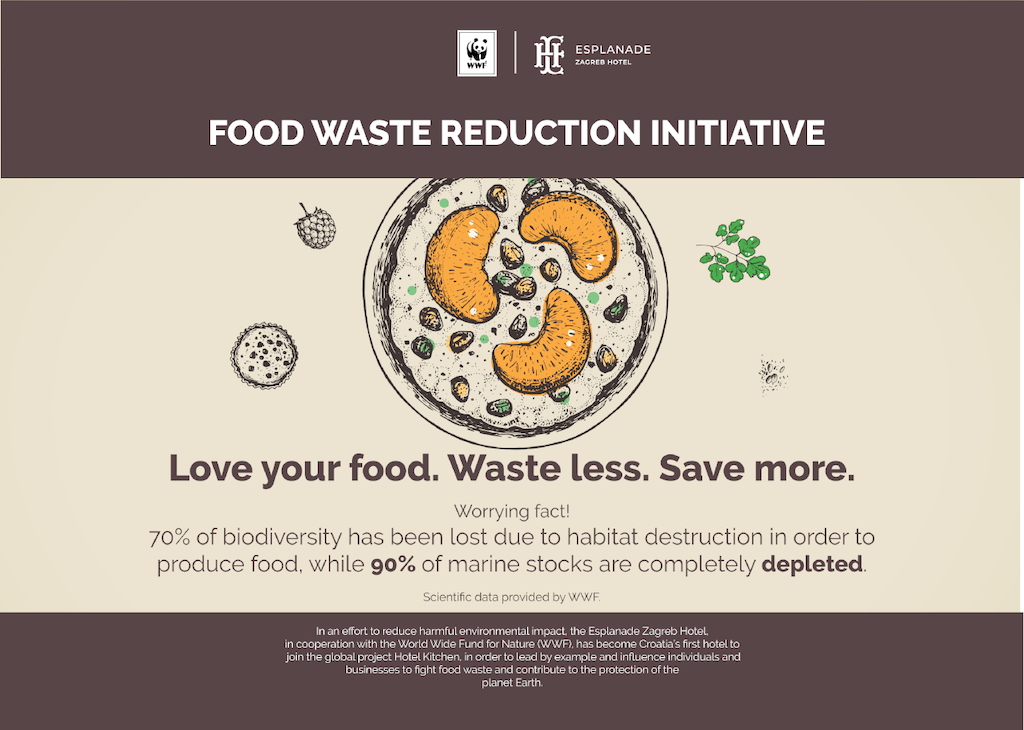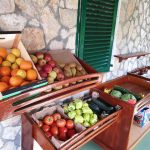WWF and Hotel Esplanade in Zagreb have joined forces through an initiative that aims at sustainability, zero food waste, and reducing environmental impact.
Esplanade Hotel is committed to implementing good practices with this strategy, with the support of WWF, to reduce the amount of organic waste it generates through its operations, reports HRTurizam on August 1, 2019.
It is estimated that around 88 million tons of food is dumped in Europe, while 1/5 of the population is at risk of poverty. The amount of food thrown away globally is more than enough to feed every hungry person on the planet. In the last 40 years, the amount of food thrown out has doubled. More than 50 million tons of fruit and vegetables grown in Europe are discarded each year just because it is distorted or the wrong size. These are just some of the worrying facts that prompted Zagreb’s Esplanade to join the WWF (World Nature Organization) Global Food Waste project as the first hotel in Croatia and the region, seeking to contribute to reducing food waste and thus reducing its adverse impact on the environment and planet Earth.
“Through its responsible business and waste management program, Hotel Esplanade has for many years sought to properly and efficiently manage food by procuring, preparing, and recycling food waste, but through this initiative, the intention is to further maximize the use of food in the kitchen and restaurants. Through informative and educational messages directed at guests, we will strive to highlight this global problem. Of course, we also want to encourage other individuals and institutions to move in this direction,” said Esplanade’s general director Ivica Max Krizmanić, adding that Esplanade Hotel strives for a ‘zero food waste’ strategy.

“This project is challenging, certain changes in the behavior of employees and guests in food management are necessary, but with the right tools and directional guidance, through proven methods and examples of good practice, we believe we will get measurable results,” said Krizmanic.
Reducing the amount of food waste is a major challenge in the quality management of the hotel and food sector. Waste, with its vast amount and pollution in the world, is not only a severe environmental problem, but also a susceptible social factor.
“For years, we have been implementing a waste reduction strategy in the entire food and beverage business, and carefully design all our menus, but there are always situations where we can further reduce food waste. We have started this project in some segments, and the plan is to continue to spread the idea of reducing food waste throughout the business. Many of our guests and clients, especially foreign ones, are aware of this issue and welcome our initiative, but there are many who simply do not think this way, so there is the need for awareness. This is not about saving, but about reducing our environmental impact together,” said Esplanade chef Ana Grgić, adding that precise measurements of food waste have revealed that most waste is generated at places like a breakfast buffet and when organizing large events with buffet meals.
“It has been observed that guests often take in far more food than they can consume, and so they throw away dozens of kilos of food every day. Buffets offer a delicious range of enticing dishes, so, understandably, guests want to try as much as possible of what is on offer. However, the hotel regularly complements the food, so some meals will not run out during breakfast or events. In this case, the hotel will throw away the excess food. Thus, they must strive for tailored communication and encourage customers to choose the right food for their events, but also encourage guests to eat smaller portions and only consume what they can handle.
In the same way, the hotel will encourage staff to adjust their food consumption to their needs, to reduce food waste in this area as well. In addition, the hotel has a special approach to the organization of food preparation, taking into account the consumption forecast given the number of guests, their profile and, for example, their nationality, which is especially useful for dishes that take a long time to cook like štrukli, desserts, breads and the like. We believe that after informing guests and educating staff, the new measurements will produce surprisingly positive results. Through this initiative, we are thinking and explicitly working for a better future for all of us,” Grgić points out.
Throwing away food is a significant economic problem for both the economy and consumers. Encouraging hotels to make a change is not only a step to keeping guests informed, but also towards raising awareness of this problem, which should ultimately be made known by every individual.
“Fighting food waste is very important to us at WWF, and we want to encourage a behavior change in our hotels. Our long-term partner, the Esplanade Hotel, has recognized this project and started implementing it to reduce food waste. According to the first data we received, we saw where significant changes were to be made, and the hotel staff was convinced not only of the environment but also of the economic benefit. We believe that with this example, we will inspire other hotels in the region to take the leap to combat excess food,” said Fabian Peronja of WWF Adria.
Esplanade has strived for many years – both through stand-alone initiatives and collaborations – to reduce waste and their environmental impact within its responsible business program. As a result, Esplanade’s lights are shut off for an hour each year to support WWF’s Earth Hour project for more rational use of energy. The hotel was the first in Croatia to introduce Tesla destination chargers, and more recently, Porsche destination chargers through which guests can charge the batteries of their vehicles for free.
Furthermore, the hotel has been working on digitizing promotional material for years, offering guests a choice of 7,000 newspapers and magazines in digital form for free. The hotel encourages guests to operate their environmentally responsible business through a program of more careful use of hotel linens and towels, and also encourages guests and staff to consume filtered tap water to reduce plastic waste.
To read more about lifestyle in Croatia, follow TCN’s dedicated page.










